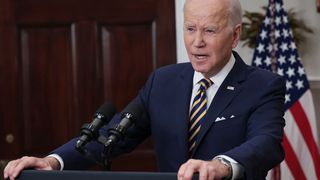The United States must de-emphasise the ideological agenda against China and develop a strategy that resonates with friends and allies in Asia, writes Peter Lee.
The United States and Australia have framed the Russian invasion of Ukraine as a reflection of a wider ideological struggle between autocracies and democracies that also encompasses China. In the US President’s State of the Union address, Joe Biden stated that “In the battle between democracy and autocracy, democracies are rising to the moment.” Scott Morrison also claimed in a recent Lowy Institute speech: “A new arc of autocracy is instinctively aligning to challenge and reset the world order in their [sic] own image.”
The strategic partnership between China and Russia indeed presents a serious challenge to US and Australian interests in Asia and Europe. Depicting Russian aggression and violence in Ukraine as a manifestation of Putin’s authoritarian dictatorship has resonated with European leaders and citizens.
However, as I argue in a review of the Biden administration’s Indo-Pacific agenda and China policy for the United States Studies Centre’s State of the United States report released today, it is less clear that a US strategy towards China framed in similar ideological terms will be effective in mobilising allies and partners in the Indo-Pacific.
Experts at the United States Studies Centre have previously argued in an in-depth report that a values-based US regional policy has limitations. The hardening US-China ideological schism misreads the region’s underlying insecurities.
Biden’s Evolving China Policy
The competitive nature of US-China relations has only intensified and deepened under the Biden administration. President Trump’s China policy was an inconsistent mix of trade mercantilism, ideological rivalry, and “great power competition”. President Biden has preserved these underlying assumptions, while also framing the relationship in more values-based terms.
Yet, absent from Biden’s approach to China has been a sense of what he envisages for US-China relations in the long term. “Competition” is the administration’s buzzword, but what “success” looks like is harder to discern. Although the US Department of Defense set up a China Task Force in early 2021 and the White House recently released its Indo-Pacific Strategy putting China’s rise in a regional context, there is still no China strategy or declared set of objectives for US China policy.
To effectively compete with China for influence in the Indo-Pacific, the United States needs to de-emphasise the ideological agenda and set forth a clearer vision of what kind of long-term relationship it seeks with China. Framing US-China relations primarily as an ideological contest, rather than over relative power and coercive behaviour, will make the competition more zero-sum and harder to build an effective coalition with politically diverse regional powers.
The Ideological Pillars of Biden’s China Policy
Biden sought to strengthen two elements of US power vis-à-vis China: US economic strength and global leadership. This led the administration to maintain the trade war with China in defence of “fair trade” and to continue dealing with China bilaterally rather than seeking arbitration through the World Trade Organization. Globally, senior State and Defense officials, many of whom built their careers working on transatlantic relations, emphasise cooperating with Europe to counter China in global forums. On both fronts, Biden sees China’s challenge as stemming from its non-democratic character and subversion of existing rules and institutions.
The United States also tried to prioritise deterring China’s actions in the Indo-Pacific. Militarily, the Pentagon settled on describing China as the top “pacing challenge”, connoting that its military modernisation will be the benchmark for US military planning. It wants to counter some of China’s technological developments such as testing a hypersonic missile and improving its nuclear arsenal by strengthening its own deterrent capability in these domains. The administration also stepped up its diplomatic and military support for Taiwan in the face of increased People’s Liberation Army Air Force flights into Taiwan’s Air Defence Identification Zone, including persuading allies like Australia, Japan, and South Korea to reference Taiwan in their joint statements with the United States.
At the same time, the administration wants to avoid military conflict and aims to cooperate with Beijing where possible. Throughout the year, the Biden administration sought to ensure “some common sense guardrails” with China and identify areas for potential cooperation, including climate change, energy supplies, Iran, North Korea, Afghanistan, and “strategic stability” issues of nuclear arsenals. Secretary Blinken similarly called for China to support the international condemnation of Russian’s invasion of Ukraine given its longstanding position on state sovereignty at the United Nations.
A Better Way: Deterring Actions not Values
Casting relations with Russia and China as an ideological contest reminiscent of the Cold War undoubtedly makes it easier for the United States to respond by rallying its public and European allies. However, framing US-China competition as the result of China’s authoritarian political system — as opposed to its coercive actions — is unlikely to resonate in the region.
It is China’s coercive actions that generate Asian insecurities and require stronger deterrence more than its authoritarian nature. Many of the region’s small and middle powers are instead trying to find a modus vivendi with China that accommodates its economic rise, including membership in regional trade blocs, while strengthening their ability to defend their interests against its coercive practises. A US China policy that only focuses on the latter will be necessary but insufficient. Justifying that policy with appeal to ideology is likely to fall on deaf ears.
From the mixed-messaging of the Summit for Democracy to the unwillingness of most Asian countries to join the diplomatic boycott of the Beijing Winter Olympics on human rights grounds, the United States will struggle to win support based on political values in a region as diverse as the Indo-Pacific.
It will also make US engagement with strategically important non-democratic states like Vietnam more awkward to manage. The rhetorical shift towards ideological binaries may help galvanise support in Europe but may prove less effective in many Asian capitals.






